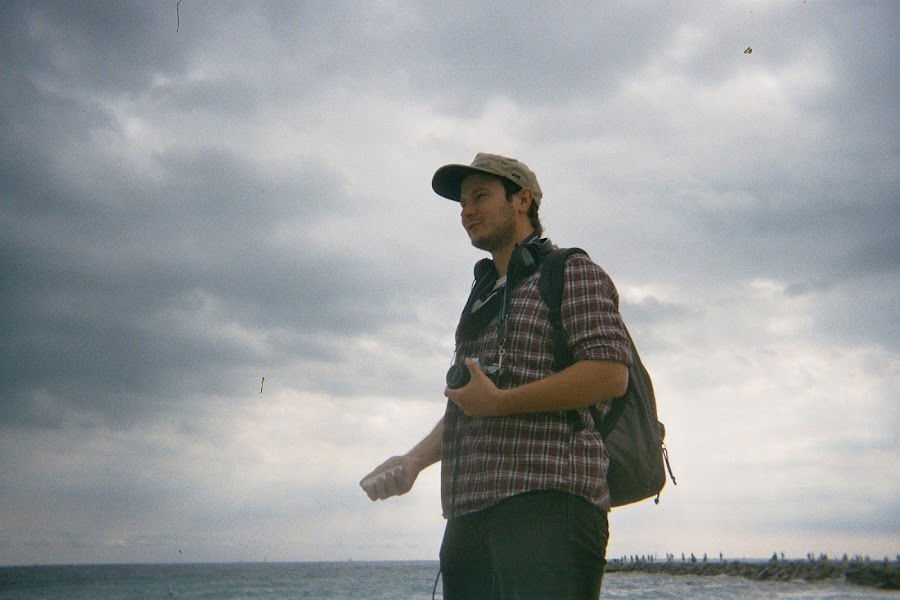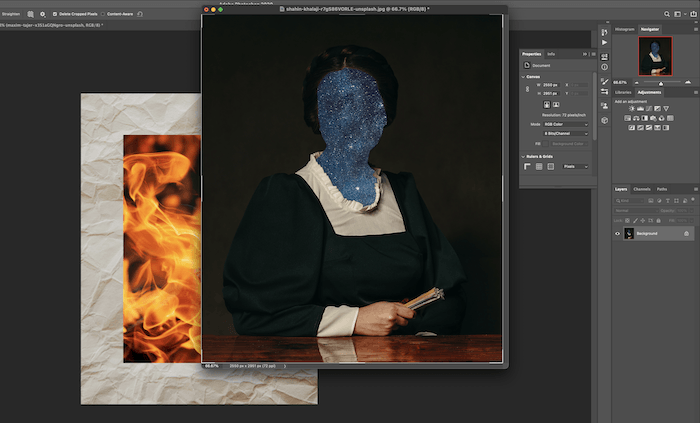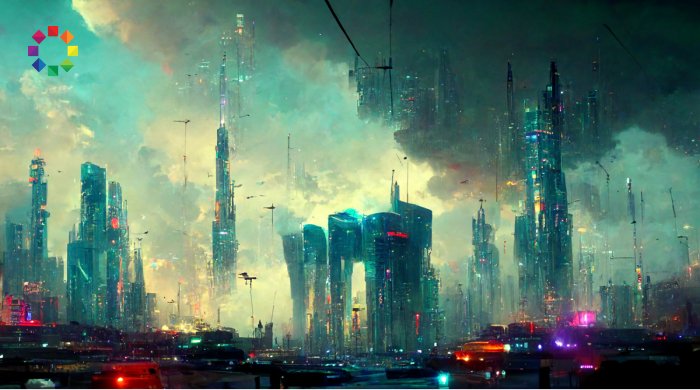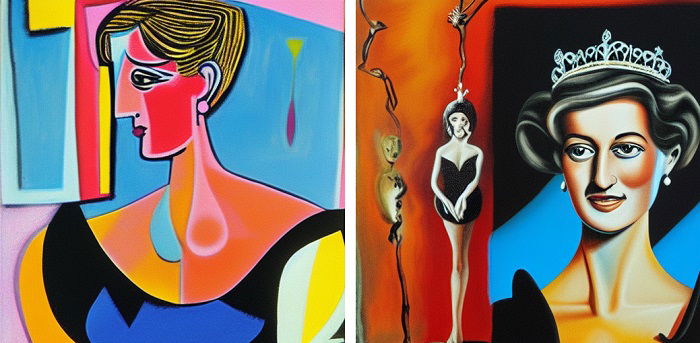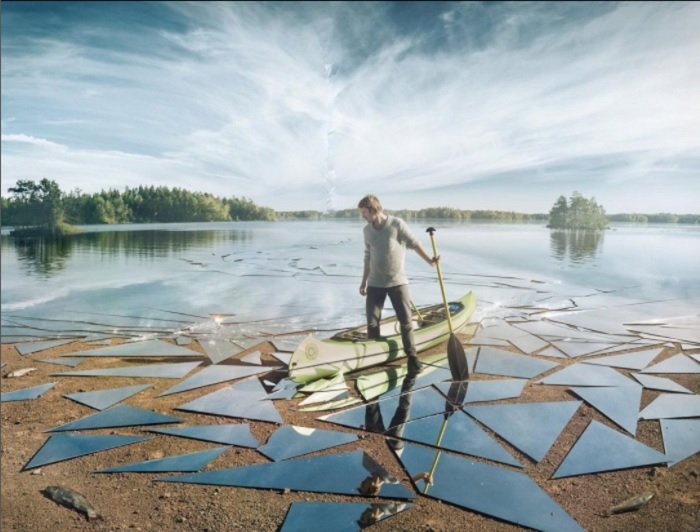Digital collage is having a boom period. Artists worldwide are using digital collages as a creative weapon to delight, inform, and amuse. It’s a powerful artistic genre. It combines photography, graphic design, and traditional skills like painting and drawing.
If digital collage is something you want to experiment with, you’re in the right place. We have ten unique digital collage ideas from some of the best digital artists. These examples are sure to inspire your own amazing digital collages.
What Is Digital Collage?
The art of collage is creating an image by combining different pictures and materials to make something unique. Traditional collage uses physical materials like paper, paints, and photos. With digital collage, the artist brings these elements together with editing software.
Digital collage is an art form of the 21st century. But its roots reach back more than 100 years. Early collages were found in the art movements of the early 1900s. This included Cubism, Surrealism, and Dadaism. Later, collage became a popular element in the pop art scene of the ’60s.
Modern technology has brought new life into the art of collage. Photoshop, other editing software, and collage apps have redefined the limits of what is possible with digital collage art. And modern collage artists are showing us these possibilities.
10 Unique Digital Collage Ideas to Inspire You
Here are ten spectacular examples of contemporary artists’ finest digital collage work. The ideas used in their digital collage art will inspire you in your own magical artwork.
1. Embrace Your Surrealist Spirit
Modern imaging software gives you an incredible amount of freedom. You can gather a vast array of images and different types of media. And you can put them together in any way your imagination sees fit.
Naomi Amber Dawn gives us a perfect example of a digital collage in the surrealist tradition. She puts familiar elements together to create a new and other-worldly scene. She deconstructs our reality and creates a surreal environment.
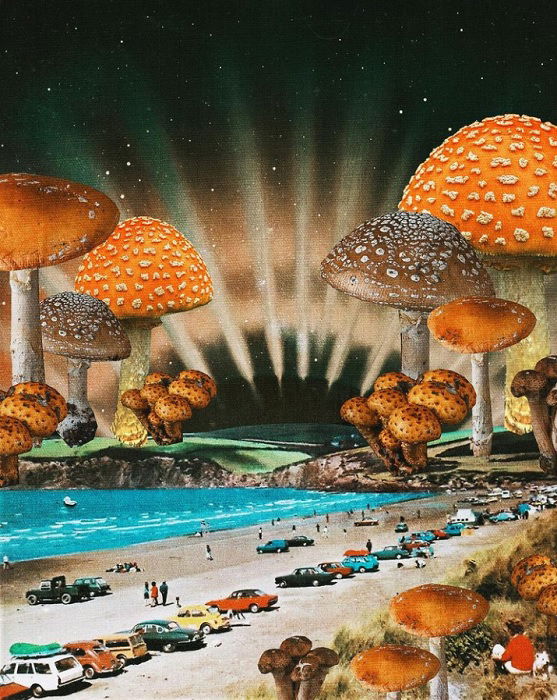
2. Utilize a Retro Aesthetic
Traditional collage artists used clippings from newspapers and magazines. The imagery was contemporary then, but it significantly impacted that collage artists still use vintage imagery of early 20th-century media.
Julien Pacaud may use digital techniques, but his digital collages stay true to the classical imagery of those early artists. We can see the grain of film photos, the texture of old newspapers, and a seemingly time-induced color fade.
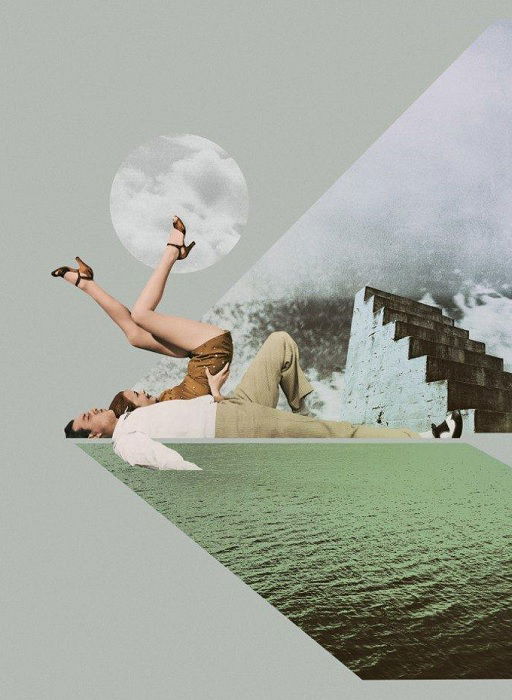
3. Teleport Viewers to Other Dimensions
Anna Maghradze uses digital collage techniques to transport her subjects to another world. By combining two or three photos, she creates unique situations. But despite the leap of imagination involved in creating such scenarios, her work seems natural.
Anna never combines more than two or three images. And this simplicity helps to give her work a sense of realism. Her digital collages have elements of surrealism but express a warped reality rather than a completely different world.
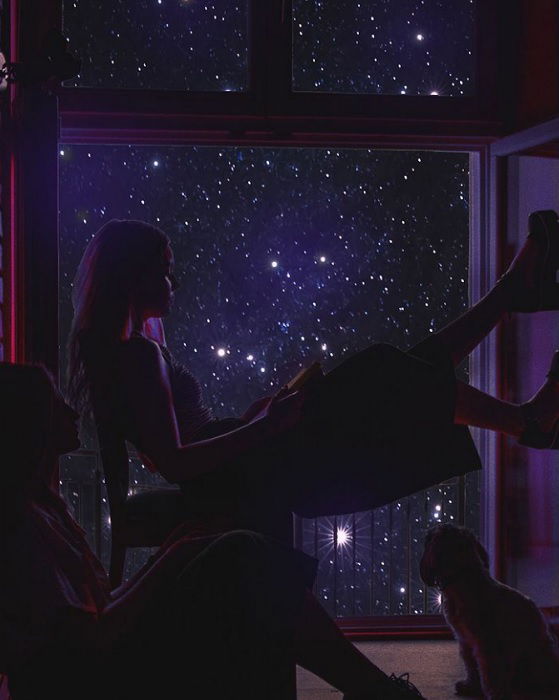
4. Combine Various Media and Techniques
Combining different media and artistic techniques is at the heart of collage-making. A paper collage would be comprised of clippings, paint, and sketches. And digital artists are keeping the multimedia approach alive.
Frankie Lee Matthews incorporates physically created elements into her digital collages. She combines them with digital clippings and photos in Photoshop. In the example below, she used makeup to paint a beach scene. You can even see the brush textures in the final digital image.
Her social media posts are an excellent source of inspiration. Her digital art and content are fabulous. And she often has helpful video tutorials accompanying her digital collages.
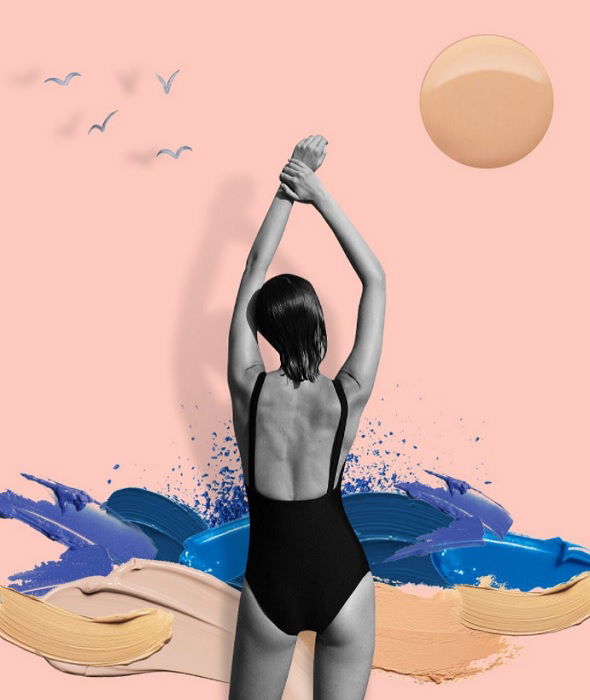
5. Replace Heads to Challenge Viewers
When we look at artwork with human subjects, our eyes are drawn toward their face. It’s a natural way to look at someone and connect. That’s why removing or replacing your subject’s head can be jarring when you make a digital collage.
Head replacement is a theme often used by digital collage artist Frank Moth. By replacing heads in his images, he dissociates the viewer. The viewer is challenged to view other details of the image.
It’s not just a cool effect. By replacing a head with something else, you’re adding meaning and depth to your digital collage.
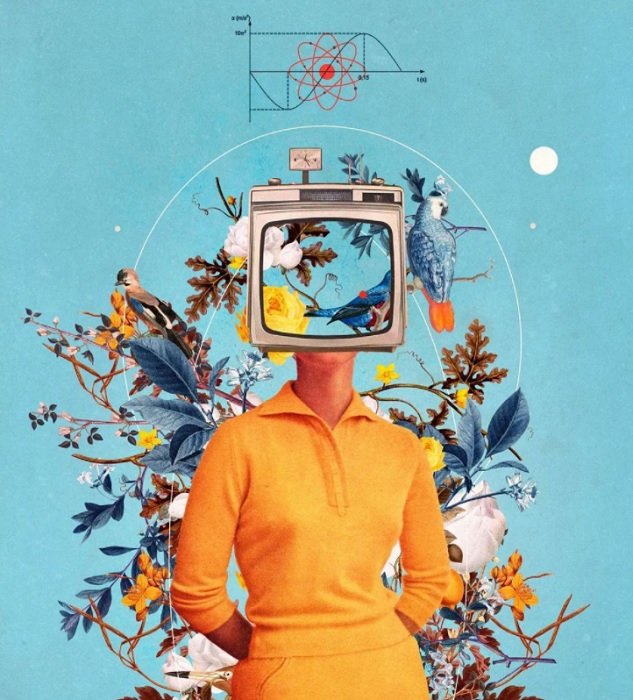
6. Electrify with Vibrant Colors
Collage artwork is often associated with faded, sun-worn colors. But if you inject pop art influence, you can create vibrant energy using bright colors. You can swap colors from source images. Or you can create brand new colorful elements in Photoshop.
Temi Coker‘s digital collages are alive with color. Coker uses bright oranges, purples, and blues to set the tone and elevate his art. He’ll often use a face or head and surround it with electric colors to create stunning digital collage portraits.
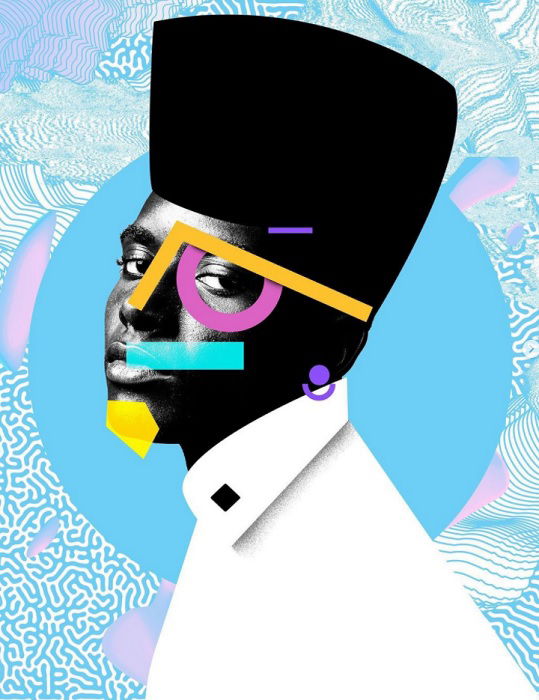
7. Go Minimalist for a Strong Composition
When creating digital collages, you have so many possibilities that getting carried away is easy. You can add another element to your art with a few clicks and a short drag. But sometimes, it’s best to show some restraint.
Anthony Zinonos shows what can be done with just a few elements. He follows the “less is more” approach. And he’s created powerful collages with a subject and a block or two of color. You can explore ideas using color and negative space using his composition examples.
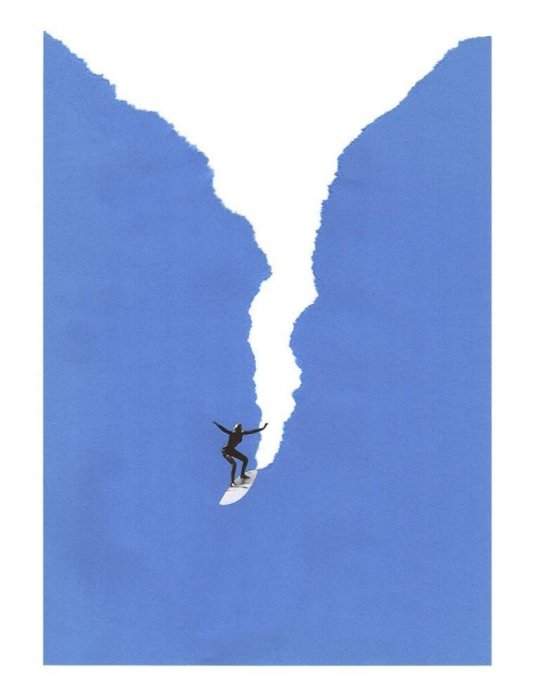
8. Tear it Down and Put it Back Together
Collage is about taking an image from one place and putting it elsewhere. Naturally, rips and tears have been a long-standing visual graphic element in the art form. Sometimes rips are hidden, creating a seamless collage. But other artists incorporate tears in their work.
The rips and tears add to the themes of deconstruction and reconstruction, as seen in the work of Labyrinth of Collage. This collage style is about pulling something apart and combining the pieces to make something new. The new image then questions or mocks its source material.
You can create the torn effect and texture using editing software. Or you can import ripped images by taking pictures with a digital camera or using a scanner. Using actual torn paper gives a layered texture and continues the multimedia tradition of collage.
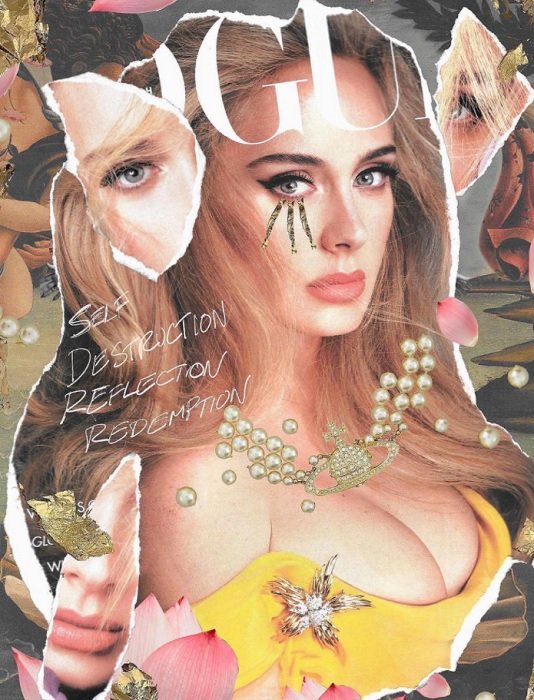
9. Tune-In to Pop Culture Past and Present
Television has been a significant source of inspiration for collage since the pop art boom of the ’50s and ’60s. Pop art grew out of the pop culture that was big at the time. And TV played a large part in that.
Screens still provide us with cultural images and ideas. But now we have computer and phone screens too.
They expose us to things that delight, educate, and horrify us. They keep us connected or transport us somewhere else. These are the ideas expressed in the digital collage of Elo Marc.
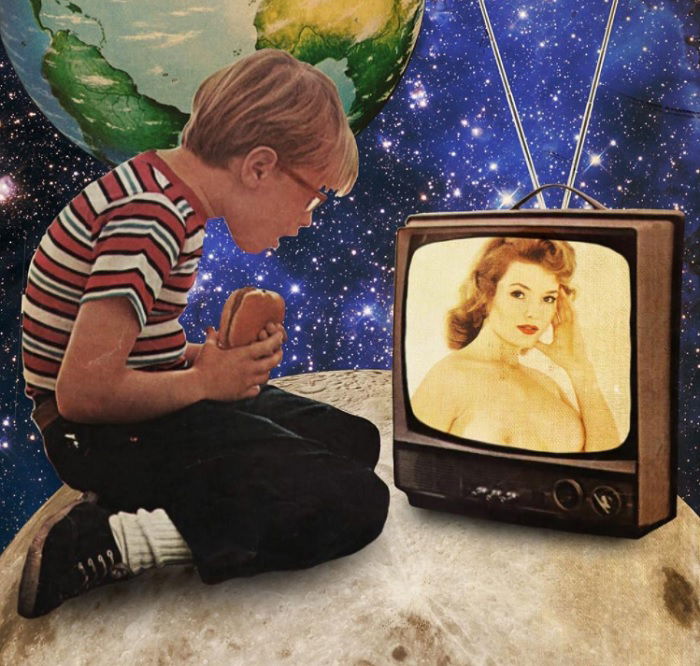
10. Use Humour to Express Yourself
Humor is often looked down upon in the art world. But when it comes to collage, you can be as funny as you like. You can use humor to add meaning to your digital collages. But just being funny can be your goal from the outset.
Kalen Hollomon combines photos and other materials to make collages that make us laugh. They use simple collage techniques, using only two or three images.
And he brings them together to deliver a visual punchline. The images are sometimes silly and irreverent. But that’s all part of the deconstructive collage and digital collage tradition.
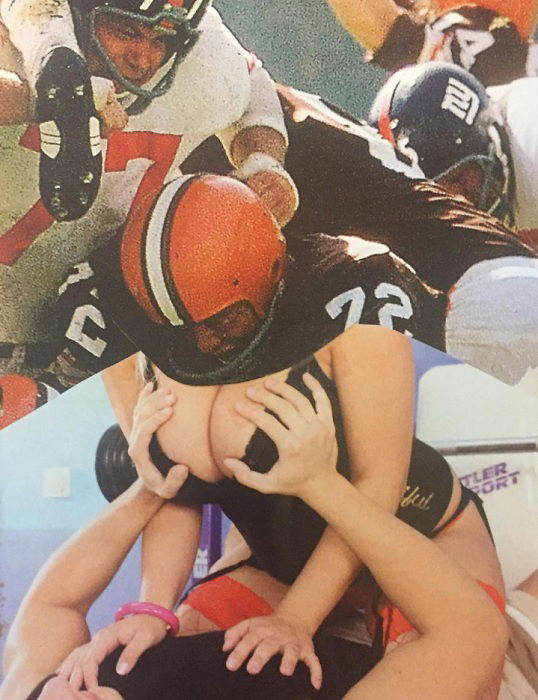
Conclusion: Unique Digital Collage Ideas
Digital image manipulation software like Photoshop has breathed new life into the genre of collage. You’re no longer limited to the pictures you can tear out of newspapers and magazines. You have a whole world of digital information to play with.
The artists exhibited in our article demonstrate a wide range of ideas and themes in digital collages. They demonstrate many new techniques. But many of the classic themes of collage still run through their art.
I hope their wonderful work gives you plenty of new digital collage ideas and inspiration to create your own. To create similar surreal photos, check out our Digital Dreamworlds eBook!
